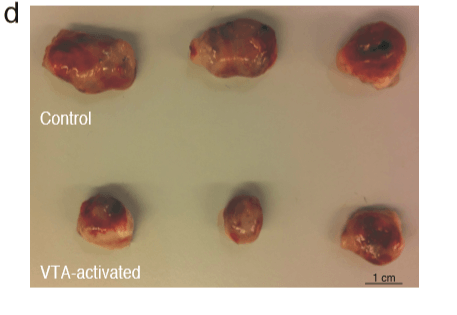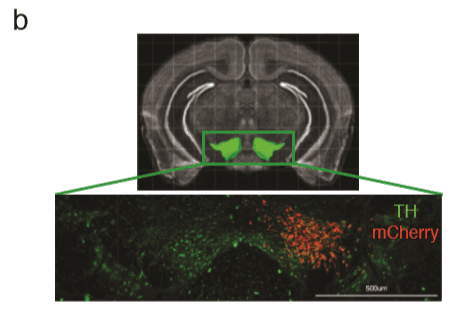Immune stimulus - researchers at the Technion were able to shrink cancerous tumors in mice by manipulating the reward area in the brain * The explanation: the intervention caused the nervous system to stimulate the activity of the immune system

Artificial activation of the reward system in the brain led to a dramatic reduction in the size of cancerous tumors in mice. This is the gist of a study conducted at the Technion and published in the journal Nature Communications. The research was led by doctoral students Tamar Ben Shanan and Maya Shiler under the guidance of Associate Prof. Asia Rolls from the Rappaport Faculty of Medicine at the Technion and Adjunct Prof. Fahad Hakim, director of the Scottish IMMS Hospital in Nazareth.
The ability of the natural immune system to destroy cancer cells is becoming more and more clear in recent years. This is the background for the growth of immunotherapy - an innovative medical approach based on the understanding that the immune system can fight cancer effectively if only given the tools to do so. In 2013, immunotherapy was defined by the editors of the journal Science as the most important breakthrough that year. "However," explains Professor Rawls, "the involvement of the immune cells in cancer processes is a double-edged sword, since certain components in these cells support the growth of the cancer tumor. This is through blocking the immune response and creating an environment that is beneficial for growth."
Prof. Rawls has been researching the effect of the brain on the activity of the immune system for years. In a study she published in 2016 with her partners in the journal Nature Medicine, she showed how the immune system can be stimulated by manipulating the dopamine reward system in the brain - a system that is activated in positive emotional states and following positive expectation. According to her, "By artificially activating the area, we are able to influence the nervous system that comes out of the brain and through it influence, among other things, the immune system." In the same article, Prof. Rawls showed that following the artificial intervention, the reward system sends transmitters to the sympathetic nervous system, which stimulates the immune system. Furthermore, as a result of the intervention, the immune system created a stronger immune memory against the bacteria it was exposed to, so it will work more efficiently the next time it is exposed to the same bacteria.
The source of most cells of the immune system is the bone marrow - that spongy tissue found in the bone. The brain maintains direct communication with the bone marrow and can influence its character. The main breakthrough in the current research is the researchers' success in harnessing the brain to influence the immune system and its way of fighting cancer. The result is a dramatic shrinking of the cancerous tumor in response to the activation of the reward system in the brain.
According to Prof. Rawls, "The relationship between emotional state and cancer has been demonstrated in the past, but mainly in negative aspects such as stress and depression and without physiological mapping of the mechanism of action. Prof. David Spiegel of the Stanford School of Medicine previously showed that improving the patient's emotional state may affect the course of the disease, but it was not clear how this happens. Now we present a physiological model that can explain part of that effect."
According to Prof. Mishna Hakim, "What is important is that by understanding the effect of the brain on the immune system and its ability to fight cancer, we can begin to use this mechanism in medical treatment. Different people react differently to things, and only from a deep understanding of the mechanisms will we be able to develop treatments and use this tremendous potential for healing."
The researchers qualify the findings by saying that this is a pre-clinical study and that they examined only two types of cancer (melanoma and lung cancer) and only two aspects of their development - tumor volume and weight. However, this is a breakthrough that allows doctors to understand the importance of the patients' mental state in the development of malignant diseases. In addition, perhaps in the future it will be possible to stimulate, through artificial activation of different brain areas, the activity of the immune system so that it will more effectively inhibit the development of cancerous tumors.
"It is clear that there is considerable application potential here," emphasizes Professor Rawls, "but it is important that people do not conclude that 'positive thinking' will necessarily increase the immune system's attack on the cancer tumor." In the current study, we performed a very strong artificial manipulation, on specific cancer types, to test the potential of the system we developed. In more natural situations, it is likely that the mechanism will work differently for several reasons: people differ in their reactions, different types of cancer react differently, and many other factors are involved in the process. For example, it is possible that mental stress will weaken the same effect of the reward system. Therefore, as mentioned, there is no place to draw conclusions about the relationship between 'positive thinking' and the anti-cancer activity in the body."

The research was carried out with the support of the Adelis Foundation. In 2017, Prof. Rolls won the Adelis Prize for brain research, which is awarded to a young Israeli researcher who breaks new ground in brain research.
The Adelis Foundation was established by the late Mr. Andre Cohen Doloro to support academic excellence in Israel in general and scientific and medical research in particular. In accordance with the spiritual legacy of the foundation's founder and his vision, it was decided in 2015 to establish the Adelis Prize for Brain Research and to allocate annually an amount of $100,000 as a research grant.
The award is intended to encourage excellence among young Israeli researchers in the field of brain research in Israel, to promote knowledge and understanding regarding the brain, its operation and diseases related to it, and to create an international impact.
Prof. Asia Rawls completed her bachelor's and master's degrees in the Faculty of Biology at the Technion. After a doctorate at the Weizmann Institute of Science and a post-doctorate in the department of psychiatry at Stanford University in California, she joined the faculty of the Rappaport Faculty of Medicine at the Technion in 2012. She was elected as a member of the Young Academy of Sciences, won the Adelis Prize for brain research, the Krill Prize from the Wolf Foundation and an ERC grant and was selected as one of the 40 international researchers from the Howard Hughes Medical Institute (HHMI).
Clinical associate professor Fahad Hakim was recently appointed director of the Scottish IMMS Hospital in Nazareth and continues to serve as a senior physician at the Children's Lung Institute at the Rambam Medical College. Prof. Mishna Hakim is an expert in pediatrics, pediatric lungs and sleep diseases and an active member of international associations for the study of lung diseases, sleep and brain research. After completing a post-doctorate in the sleep research department at the University of Chicago in Illinois in 2013, he joined the faculty of the Rappaport Faculty of Medicine at the Technion.

One response
Only nano technology will save us from the patchwork of this universe...